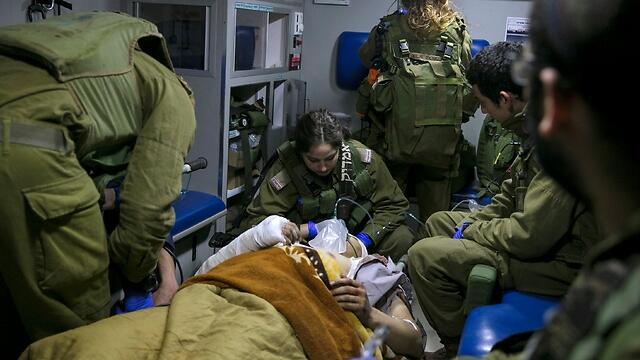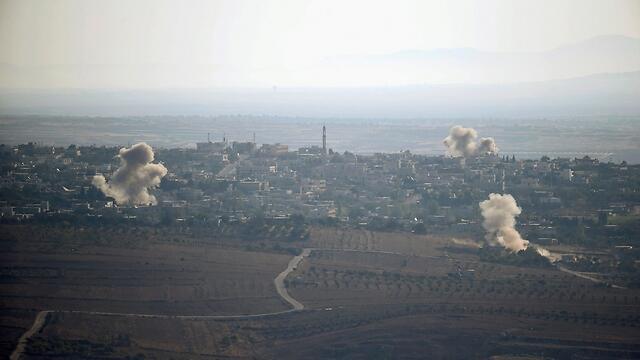It happens nearly every night. After dark, the Syrian wounded come to known locations on the Israel-Syria front in the Golan Heights, driven by desperation to seek help from an enemy army.
Israeli soldiers on lookout or patrol spot them waiting by the fence and whisk them away to a rear position where army medics soon arrive, according to army officials operating in the Golan Heights.
- Israel refuses to accept refugees fleeing the nearly six-year conflict in Syria, a country with which it remains technically at war. But it has allowed in more than 2,600 Syrians for medical care.
2 View gallery


IDF medical personnel treat a wounded Syrian in an ambulance on the Israel-Syria border (Photo: Reuters)
(Reuters)
On one bitterly cold January night, gunfire and explosions could be heard in the near distance as Israeli medics dressed the injuries of two Syrian men, one suffering a head wound.
"We're doing everything we can to save their lives, to stabilize them and evacuate them to the hospital," said Captain Aviad Camisa, deputy chief medical officer of the Golani brigade.
The medics lift the wounded men onto an army ambulance which slowly drives off down a dirt road.
A Syrian family -- two grandparents, a mother, father and a child aided by a walker -- pass by as they prepare to cross back into Syria in the dead of night.
"Some of the stories stir your emotions. When children come, as a father, it touches me personally," Camisa said.
Millions have fled and hundreds of thousands have been killed in Syria's conflict, which shows only fitful signs of being resolved.
The trail to Israel is full of risks.
Those who spoke to Reuters at Ziv medical Center in Tzfat, northern Israel, did so freely, but asked not to be identified by name or have their faces photographed or filmed for fear of retribution back home.
The Israeli army helped facilitate access to the hospital, perhaps concerned to counter the negative image it has in most of the Arab world.
One man, his legs pierced by shrapnel, survived a bomb attack in his village in which 23 people were killed.
"In the past we used to know Israel as our enemy. That's what the regime used to tell us," he said. "When we came to Israel we changed our minds, there is no enmity between us.
"In the end we discovered that our regime is the enemy of us all," he said, referring to Syrian president Bashar al-Assad.
In a nearby room sits a seven-year-old Syrian girl, her mother by her side. She was hit by shrapnel from a mortar shell about two months ago and suffered life-threatening injuries; her internal organs and three of her limbs were badly hurt.
"In the first weeks we try not to ask them many questions because we are afraid that it will be more stress," said Issa Fares, an Israeli Arab Christian social worker at the hospital, where many of the staff are native Arabic speakers.
Israel has not formally taken sides in the Syrian conflict. It opposes the presence of Iranian forces and the Lebanese militia Hezbollah ranged alongside Assad, but is also alarmed by the hardline Islamist groups fighting against him.


